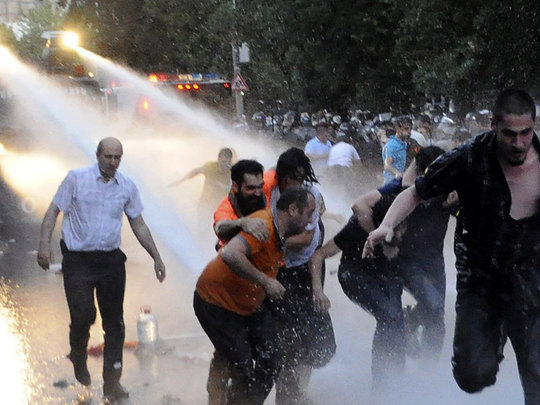
Yerevan (Armenia): Hundreds of demonstrators in the Armenian capital ignored police calls to disperse on Wednesday, digging in for a new day of protests against electricity price hikes and police violence.
Braving sweltering heat in Yerevan, some 600 protesters — mainly young people — vowed to keep up the pressure on President Serzh Sarkisian’s government until it reverses a decision to raise electricity tariffs for households.
Public anger has mounted over a move by a Russian-owned company to hike power prices by more than 16 per cent from August 1 in the poor ex-Soviet country of 3.2 million, which has already been badly hit by the economic crisis in Russia.
The protests started on Friday and gained momentum after hundreds of riot police moved in early Tuesday to forcefully break up a rally using water cannons, in the most serious confrontation between protesters and police in the past few years.
“The government will be forced to satisfy our demands if we show our resolve to continue the protests,” 19-year-old student Karen Margarian told AFP.
“Our ranks will grow,” said another young protester, Anait Kazarian. “What we demand from the government concerns each family in Armenia.”
Amid the temperature of more than 37 degrees Celsius, many took shade under the trees, with more protesters expected to join the rally in the evening.
On Tuesday more than 6,000 rallied near the presidential palace and hundreds stayed for an overnight sit-in, blocking traffic on Yerevan’s main thoroughfare.
Supporters sought to prevent a repeat of clashes, with lawmakers, local celebrities and priests forming a human chain between police and the demonstrators overnight.
Similar protests were held in several other cities, including Gyumri which hosts a Russian military base.
The ranks of demonstrators grew after police detained nearly 240 people, attacked journalists and used water cannon to break up the rally in the small hours of Tuesday. All of the protesters had been released by Wednesday afternoon.
Activists reacted to the crackdown with a dose of humour, returning to the city centre Tuesday evening armed with rubber ducks and water pistols.
Despite anger over the authorities’ inability to lift the small landlocked nation out of poverty, the mood at the protests has been largely festive, with some performing the national dance kochari, singing songs and declaiming poetry.
Washington, Brussels and the OSCE all expressed concerns over police violence.
The protest hashtag #ElectricYerevan gained traction on Twitter, with supporters taking to social networks to buttress the campaign.
“The Armenian government thinks they solved protester problem with water cannon. Wrong. They baptised new generation of activists,” wrote Babken DerGrigorian, a researcher at the London School of Economics, on Twitter.
“The more you water us, the more we will grow,” tweeted Tigran Grigoryan.
While some in Russia suggested the protests could grow to resemble Ukraine’s anti-government rallies that ousted a Moscow-backed leader last year, many insisted the Armenian rallies were not politicised.
“This is a non-political reaction to an endemic economic marginalisation of a large segment of the Armenian populace,” Serj Tankian, the Armenian-American leader of the band System of a Down, wrote on Facebook.
Owned by the Russian state-controlled holding Inter RAO, Armenia’s power distribution company demanded the government raise electricity tariffs due to a sharp devaluation of the national currency, the dram.
Armenia, an ally of Moscow, has been hit hard by the economic crisis in Russia brought on by falling oil prices and Western sanctions over Ukraine.
In January, the country joined the Russian-led Eurasian Economic Union, further increasing Yerevan’s dependence on its former imperial master.
The Kremlin expressed hope on Tuesday that the situation would be settled in “strict accordance with the law”.











